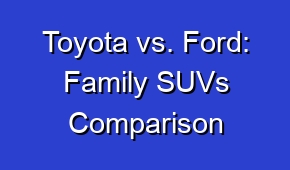Car Buying Tips

Clear tips for buying a car: 1. Research different models and prices. 2. Set a budget and stick to it. 3. Test drive before purchasing. 4. Consider financing options. 5. Get a vehicle history report. 6. Negotiate the price. 7. Have a mechanic inspect the car. 8. Don’t rush, take your time.
Are you looking to buy a new car? Follow these car buying tips to ensure a smooth and successful purchase. Research different car models and compare prices from various dealerships to find the best deal. Don’t forget to check online reviews and ratings to make an informed decision. Budgeting is crucial, so calculate your monthly expenses and determine how much you can afford to spend on a car. When visiting dealerships, negotiate the price and consider getting pre-approved for a loan to streamline the buying process. Take the car for a test drive to assess its performance and comfort. Lastly, carefully review the purchase agreement before signing on the dotted line.
| Research car prices before visiting dealerships. |
| Consider fuel efficiency when choosing a car. |
| Test drive multiple vehicles to compare performance. |
| Check the vehicle history report for any accidents. |
| Get pre-approved for a car loan before shopping. |
- Inspect the car’s condition thoroughly before purchasing.
- Compare insurance rates for different car models.
- Consider the resale value of the car you’re interested in.
- Ask for a warranty on a used car.
- Don’t rush the car buying process, take your time.
What are the most important factors to consider when buying a car?
When buying a car, it’s crucial to consider several factors. Budget is a key element, as it determines the type of car you can afford. Vehicle Type is also important, whether you prefer a sedan, SUV, or truck. Reliability should be prioritized, ensuring that the car has a good track record and won’t require frequent repairs.
Fuel Efficiency is another crucial consideration, as it affects long-term costs. Safety Features should not be overlooked, such as airbags, anti-lock brakes, and stability control. Resale Value is worth considering, as it indicates how well the car retains its value over time.
Additionally, Insurance Costs should be factored in, as they can vary depending on the car model. Test Driving the car is essential to ensure it meets your expectations in terms of comfort, handling, and performance. Finally, researching Customer Reviews and Comparing Prices across different dealerships can help you make an informed decision.
How can I determine my budget for buying a car?
Determining your car-buying budget involves evaluating your income, expenses, and savings. Assess how much you can comfortably allocate towards car payments without compromising other financial obligations.
Consider the total cost of ownership, including not only the purchase price but also insurance, fuel, maintenance, and potential repairs. This ensures you can afford the car in the long run.
Remember to consider financing options, such as a car loan or leasing. Use online calculators to estimate monthly payments and determine an appropriate budget.
Should I buy a new or used car?
Deciding between a new or used car depends on various factors. New cars offer the latest features, warranties, and the peace of mind that comes with owning a brand-new vehicle.
Used cars often provide better value for money, as they have already experienced significant depreciation. However, consider factors such as maintenance history and potential repairs when buying used.
Ultimately, your decision should be based on your budget, personal preferences, and priorities, such as whether you prioritize the latest features or lower costs.
What are the steps involved in buying a car?
The car-buying process involves several steps. Start by defining your needs and budget. Research different car models and narrow down your choices.
Next, research prices and compare deals from different dealerships. It’s essential to schedule test drives to evaluate the cars firsthand.
Once you’ve found the right car, negotiate the price and explore financing options. Read and understand the sales contract before signing it.
Finally, make the necessary arrangements for insurance and vehicle registration to ensure you can legally drive your new car.
What should I look for during a test drive?
During a test drive, pay attention to comfort, handling, and performance. Assess how the car feels while accelerating, braking, and taking turns.
Check for interior features and controls that are user-friendly and suited to your preferences. Evaluate the visibility from the driver’s seat.
Listen for any unusual sounds or vibrations while driving, as they may indicate potential issues. Test the brakes and steering for responsiveness and smooth operation.
Finally, consider the ride comfort and whether the car meets your expectations in terms of noise insulation and suspension performance.
How do I negotiate the price of a car?
Negotiating the price of a car involves several strategies. Research the car’s market value and use it as a starting point.
Be prepared to walk away if the dealer is unwilling to negotiate. Consider getting pre-approved for financing to have a better idea of your budget.
During negotiations, remain calm and confident. Focus on the total out-the-door price rather than just the monthly payments.
Consider trade-ins and explore any incentives or promotions that may help lower the price. Remember, there’s often room for negotiation.
How can I check the reliability of a car?
To check the reliability of a car, consult reliable sources such as consumer reports, car review websites, and manufacturer recalls.
Look for models with a good track record and low reported issues. Consider long-term reliability by researching the car’s performance over time.
It’s also helpful to test drive the car and pay attention to any potential mechanical issues or signs of poor reliability.
Lastly, check the warranty offered by the manufacturer, as it can indicate their confidence in the car’s reliability.
What should I consider when financing a car?
When financing a car, consider factors such as interest rates, loan terms, and monthly payments. Shop around for the best financing options.
Pre-approval for a car loan can provide a better understanding of your budget and negotiating power.
Be cautious of long loan terms that may result in higher overall costs. Understand any penalties or fees associated with the loan.
Read and understand the loan agreement before signing, ensuring you are aware of the total amount financed and any additional costs.
What are the advantages of buying from a dealership?
Buying from a dealership offers several advantages. Warranty protection is often provided, offering peace of mind regarding potential repairs.
Dealerships may offer additional services such as maintenance packages, financing options, and trade-in opportunities.
They also provide a wide selection of new and used cars, allowing you to compare different models and find the one that suits your needs.
Furthermore, dealerships often have certified pre-owned vehicles that undergo thorough inspections, offering reliable used options.
Should I get a vehicle history report before buying a used car?
Obtaining a vehicle history report is highly recommended when buying a used car. It provides valuable information about the car’s past.
A history report can reveal accidents, title issues, previous owners, and maintenance records. It helps identify potential red flags.
Ensure the report includes a vehicle identification number (VIN) check and review it thoroughly before making a purchase decision.
What is the best time to buy a car?
The best time to buy a car is often towards the end of the calendar year or quarter. Dealerships may offer better deals to meet sales targets.
Additionally, holiday weekends and special promotions can provide opportunities for discounts and incentives.
Consider buying a car when new models are released, as dealerships may offer discounts to make room for the latest inventory.
Lastly, weekday mornings or early evenings can be less crowded, allowing for more personal attention from salespeople.
What are the most important documents when buying a car?
When buying a car, important documents include your driver’s license, proof of insurance, and payment method (such as a check or credit card).
Additionally, you’ll need the vehicle title or registration certificate to transfer ownership. Ensure the seller provides a bill of sale as proof of purchase.
If financing the car, you’ll need loan documents and proof of income. Finally, keep copies of all documents for your records.
What are the advantages of buying from a private seller?
Buying from a private seller can offer certain advantages. Lower prices are often negotiable, as private sellers may not have dealership overhead costs.
Flexible negotiation and payment options can be discussed directly with the seller, potentially allowing for more favorable terms.
Private sellers may provide detailed maintenance records and service history of the car, offering transparency regarding its condition.
However, be cautious of potential risks, such as limited warranty options and the need for a thorough mechanical inspection.
What are the key factors to consider when buying a used car?
When buying a used car, key factors to consider include the car’s condition, maintenance history, and mileage.
Inspect the car thoroughly for any signs of damage or repairs. Consider having a mechanical inspection performed by a trusted mechanic.
Review the service records to ensure regular maintenance has been performed. Lower mileage often indicates less wear and tear on the car.
Furthermore, consider the age of the car and whether it aligns with your expectations in terms of reliability and technology features.
What should I consider when choosing a car insurance policy?
When choosing a car insurance policy, consider factors such as coverage options, deductibles, and premiums.
Assess your driving habits and risk tolerance to determine the appropriate coverage levels for liability, collision, and comprehensive insurance.
Compare quotes from multiple insurers to find the best premium rates and ensure you understand any exclusions or limitations in the policy.
Additionally, consider customer reviews and the insurer’s reputation for customer service and timely claims processing.
What are the benefits of buying a hybrid or electric car?
Hybrid and electric cars offer several benefits. Fuel efficiency is significantly higher, resulting in lower fuel costs and reduced environmental impact.
Tax incentives and rebates may be available for hybrid or electric car purchases, further reducing the overall cost of ownership.
Additionally, these cars often have lower maintenance costs due to fewer moving parts and less reliance on traditional combustion engines.
Hybrid and electric cars contribute to a sustainable future by reducing greenhouse gas emissions and dependence on fossil fuels.
What should I do if I encounter a lemon car?
If you encounter a lemon car, document all issues and repair attempts. Consult your state lemon law to understand your rights.
Contact the manufacturer or dealership to report the issues and seek a resolution. They may offer repairs or a replacement vehicle.
If the issue persists, consider filing a complaint with relevant consumer protection agencies or seeking legal assistance to enforce your rights.
Ensure you have all relevant documentation and communication records to support your case.
What should I know about vehicle financing options?
When considering vehicle financing options, understand the interest rates, loan terms, and down payment requirements.
Research different lenders, such as banks, credit unions, and online lenders, to find the most competitive rates and terms.
Consider whether leasing or buying is the better option for your circumstances, factoring in long-term costs and ownership preferences.
Read and understand the loan agreement before signing, ensuring you are aware of all the terms, fees, and total amount financed.
What are the advantages of buying a car with cash?
Buying a car with cash offers several advantages. It eliminates the need for monthly loan payments and interest charges.
You can often negotiate a lower purchase price when paying in cash, as it provides immediate funds to the seller.
Additionally, buying with cash avoids the depreciation that occurs when financing a car, as you own the vehicle outright from the start.
However, consider your overall financial situation and whether using cash for a car purchase is the best use of your funds.
What are the key factors to consider when buying a family car?
When buying a family car, consider factors such as safety features, interior space, and ease of access.
Look for cars with high safety ratings, including advanced safety features such as collision avoidance systems and rearview cameras.
Consider the number of passengers the car can comfortably accommodate and whether it has sufficient storage space for family needs.
Ensure the car has child-friendly features, such as ample legroom, easy-to-use child seat anchors, and rear door child locks.





















